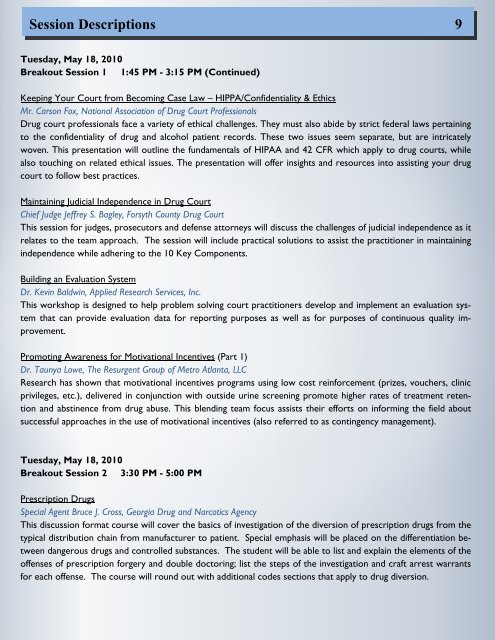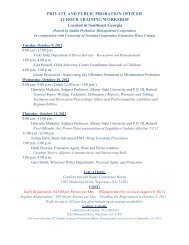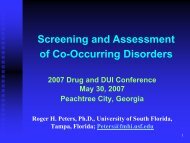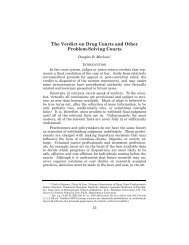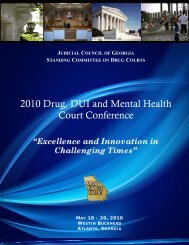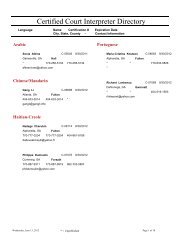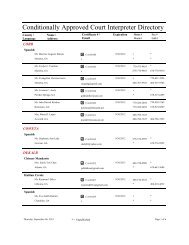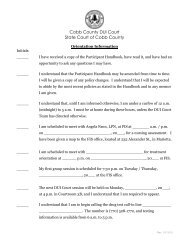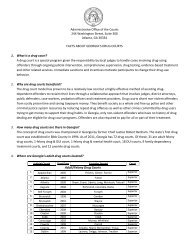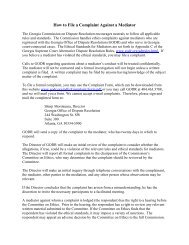2010 Drug, DUI and Mental Health Court Conference
2010 Drug, DUI and Mental Health Court Conference
2010 Drug, DUI and Mental Health Court Conference
Create successful ePaper yourself
Turn your PDF publications into a flip-book with our unique Google optimized e-Paper software.
Session Descriptions 9<br />
Tuesday, May 18, <strong>2010</strong><br />
Breakout Session 1 1:45 PM - 3:15 PM (Continued)<br />
Keeping Your <strong>Court</strong> from Becoming Case Law – HIPPA/Confidentiality & Ethics<br />
Mr. Carson Fox, National Association of <strong>Drug</strong> <strong>Court</strong> Professionals<br />
<strong>Drug</strong> court professionals face a variety of ethical challenges. They must also abide by strict federal laws pertaining<br />
to the confidentiality of drug <strong>and</strong> alcohol patient records. These two issues seem separate, but are intricately<br />
woven. This presentation will outline the fundamentals of HIPAA <strong>and</strong> 42 CFR which apply to drug courts, while<br />
also touching on related ethical issues. The presentation will offer insights <strong>and</strong> resources into assisting your drug<br />
court to follow best practices.<br />
Maintaining Judicial Independence in <strong>Drug</strong> <strong>Court</strong><br />
Chief Judge Jeffrey S. Bagley, Forsyth County <strong>Drug</strong> <strong>Court</strong><br />
This session for judges, prosecutors <strong>and</strong> defense attorneys will discuss the challenges of judicial independence as it<br />
relates to the team approach. The session will include practical solutions to assist the practitioner in maintaining<br />
independence while adhering to the 10 Key Components.<br />
Building an Evaluation System<br />
Dr. Kevin Baldwin, Applied Research Services, Inc.<br />
This workshop is designed to help problem solving court practitioners develop <strong>and</strong> implement an evaluation system<br />
that can provide evaluation data for reporting purposes as well as for purposes of continuous quality improvement.<br />
Promoting Awareness for Motivational Incentives (Part 1)<br />
Dr. Taunya Lowe, The Resurgent Group of Metro Atlanta, LLC<br />
Research has shown that motivational incentives programs using low cost reinforcement (prizes, vouchers, clinic<br />
privileges, etc.), delivered in conjunction with outside urine screening promote higher rates of treatment retention<br />
<strong>and</strong> abstinence from drug abuse. This blending team focus assists their efforts on informing the field about<br />
successful approaches in the use of motivational incentives (also referred to as contingency management).<br />
Tuesday, May 18, <strong>2010</strong><br />
Breakout Session 2 3:30 PM - 5:00 PM<br />
Prescription <strong>Drug</strong>s<br />
Special Agent Bruce J. Cross, Georgia <strong>Drug</strong> <strong>and</strong> Narcotics Agency<br />
This discussion format course will cover the basics of investigation of the diversion of prescription drugs from the<br />
typical distribution chain from manufacturer to patient. Special emphasis will be placed on the differentiation between<br />
dangerous drugs <strong>and</strong> controlled substances. The student will be able to list <strong>and</strong> explain the elements of the<br />
offenses of prescription forgery <strong>and</strong> double doctoring; list the steps of the investigation <strong>and</strong> craft arrest warrants<br />
for each offense. The course will round out with additional codes sections that apply to drug diversion.


